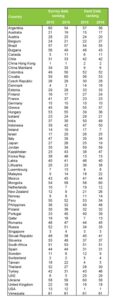
IMD World Competitiveness Ranking: Survey and hard data
Following up on feedback from several readers, in this criterion of the month we explore the IMD World Competitiveness Ranking’s core components: its hard and survey data elements. We divide our overall ranking into these components and rank both sets of data individually for the years 2015 and 2016. The objective is to observe variations in the data in a one-year period. We must emphasize, however, that the two core rankings should not be compared with each other nor with the overall ranking. Rather they should be considered as complement to each other leading to a richer picture of the competitiveness of countries.
On the one hand, hard data lag a minimum of one year behind survey data. In this sense, indicators developed through survey questions (e.g., creation of firms) assess the impact of related hard data indicators (e.g., start-up days and start-up procedures). We thus consider hard data as indicators of competitiveness inputs and survey data as indicators of competitiveness outputs. On the other hand, our survey has been designed to assess fundamental aspects of competitiveness for which hard data are not available (e.g., image abroad of the country) but that are necessary to build a robust assessment of competitiveness.

With this in mind, it is worth noticing that, as expected, fluctuations in the survey data (when comparing the 2015 data to that of 2016) are largely greater than shifts in the hard data for the same period. Shifts in hard data result from any revisions of the indicators’ definition, or from recalculations of previous estimates, by data providers (e.g., IMF). To the extent that this is so, it is difficult to control for the impact of such changes. Fluctuations in survey data may be indicative of the level of optimism/pessimism that prevails in different countries during particular periods of time. In this sense, survey data capture specific socio-political and/or economic events that underline the outlook of respondents and which are to a large extend neglected (if not impossible to capture) by the hard data.
To control for optimism/pessimism’s effect in survey data, in 2015 we incorporated survey questions designed to capture that effect. However, to ensure a fair degree of robustness, it is necessary to employ a time-series of the “controlling” questions in order to trace patterns in the data. We have thus planned to begin assessing optimism/pessimism in our survey in 2017.
Research Information & Knowledge Hub for additional information on IMD publications
In a world fractured by rival empires and the rise of protectionist ideologies, Europe remains an exception: a continent of stability, rules and trust. Too often described as a museum of past glories, it has in fact become the most prosperous, equ...
Switzerland leads 69 nations in digital competitiveness – but its position is threatened by trade fragmentation. Today’s trade fragmentation means countries and regions are in a race against time to find new strategic advantages in the digital sph...
in I by IMD
Research Information & Knowledge Hub for additional information on IMD publications
Research Information & Knowledge Hub for additional information on IMD publications
Research Information & Knowledge Hub for additional information on IMD publications
Research Information & Knowledge Hub for additional information on IMD publications
Research Information & Knowledge Hub for additional information on IMD publications
Research Information & Knowledge Hub for additional information on IMD publications
in I by IMD
Research Information & Knowledge Hub for additional information on IMD publications
IMD World Competitiveness Center Report, November 2025
Research Information & Knowledge Hub for additional information on IMD publications
Research Information & Knowledge Hub for additional information on IMD publications
Research Information & Knowledge Hub for additional information on IMD publications








